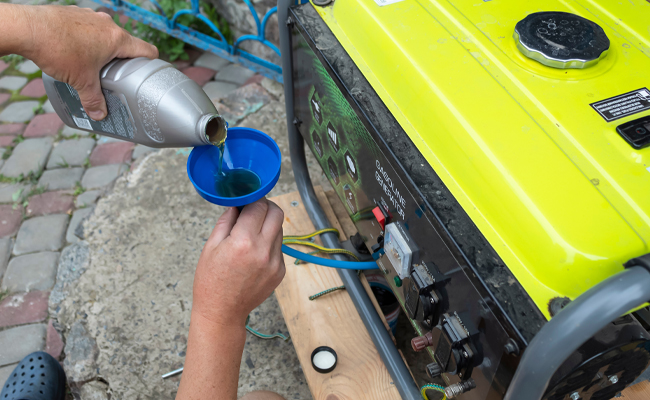Follow These Generator Maintenance Tips To Keep Your Generator Ready For The Next Power Outage!
Most people add a generator to their home for peace of mind – knowing that in the event of a power outage their vital equipment will be able to keep on running. However, something that is occasionally neglected is generator maintenance. To maximize a new generator’s lifespan, preserve the manufacturer’s warranty, and prevent unexpected failures, it is essential to follow the recommended maintenance schedule.
Today we’re sharing our top generator maintenance tips for keeping your generator system ready to go in case of emergencies. Some of these are as simple as checking fluid levels and looking for leaks, while others are projects best left to professionals or people who are not intimidated by fairly complex DIY projects.
For homeowners who just want to know that their generator is going to work the next time it’s needed, we offer a monthly service plan which keeps your entire home, including generators, in top condition.
How often should I maintain my generator?
Even when not in use, your generator needs to be maintained annually. In addition to time-based maintenance, most generators have a maintenance schedule based on hours of operation. It is typical for generators to require maintenance after the first 25 hours of operation, with the next intervals coming every 200 hours of use.
Things to check every time your generator is running:
While some maintenance tasks can wait to be performed, these are the three things you should do every time your generator is called on to power your home:
Check for gas or oil leaks
While rare, gas and oil leaks pose a serious fire risk and you should not run your generator if one is present. Visually inspect your generator for leaks, and turn off your generator if you find any. Pay particular attention to hoses and connection points as these are the areas most susceptible to leaks.
Check oil level
Generators are essentially just motors which create electricity, and just like the motor in your car they need lubrication in order to work. Running your generator without oil will cause it to rapidly overheat and fail. You should check your generator’s oil level every time it runs to keep it from wearing out prematurely. If the oil level is low, top it up and consider scheduling an inspection to verify there are no leaks.
Inspect enclosure for blocked ventilation louvers
The air vents built into your generator’s enclosure play a critical role – bringing in fresh air while allowing heat and exhaust fumes to exit. Each time your generator is in use you should inspect the enclosure and make sure that dirt, plants, or even snow drifts aren’t encroaching on these vents.
Even when your generator is not in use, you should do your best to keep the area around the generator free from plants or debris. Your generator emits hot air when running, so pay particular attention to any potential ignition sources.
Other Routine Generator Maintenance
Air Filter
Your generator’s air filter keeps particulates out of its motor. Over time, this filter will clog making it more difficult for your generator to produce power. Typically, air filter replacements are recommended based on hours of operation, although you should follow your manufacturer’s recommended maintenance plan.
Oil & Oil Filter
Just like your car, your home’s standby generator needs its oil and oil filter replaced as a part of its regular maintenance. Over time, oil will gradually become less effective at protecting moving parts from friction, resulting in higher operating temperatures and accelerated wear.
Generac recommends performing an oil change every 200 hours of operation, or every 100 hours in hot climates.

Coolant
Most Generac backup power generators are air-cooled, meaning that this is one less maintenance item that you’ll need to worry about. However, if your generator uses a liquid cooling system you’ll want to follow the manufacturer’s recommended replacement schedule. When replacing your coolant, select one that is suitable for your climate.
Spark Plugs
Your generator’s spark plugs are a long lasting part, but will eventually need to be replaced. For Generac generators, the typical recommendation is to inspect the spark gap every 400 hours of operation, adjusting or replacing the plugs if necessary.
Automatic Transfer Switch
An automatic transfer switch detects when your home’s connection to the municipal electrical system has been interrupted and then activates your generator. These switches are very robust and can last for decades if kept in good condition.
You should have a certified electrician inspect the transfer switch for loose wires or corrosion once a year, and ensure that everything is working properly.
Test electrical output of generator
Every generator has a rated power output, but it is hard for homeowners to verify that their generator is hitting those numbers. As a part of your annual generator maintenance, you should have a licensed electrician check the power output and stability of your generator.
If your generator’s output is highly variable, this is a sign of a problem in the generator and can even damage your household appliances.
Maintenance keeps your backup generator ready for action
By their very nature, home generators spend most of their life not in use. When the power goes out, they (hopefully) spring into action, keeping your home’s critical systems online. It is essential for anyone who has already added a generator to their home, or is considering installing a generator, to follow the recommended preventative maintenance.
At Rytec, our monthly maintenance plan includes home generator services, and will ensure that your generator is always ready for action!


